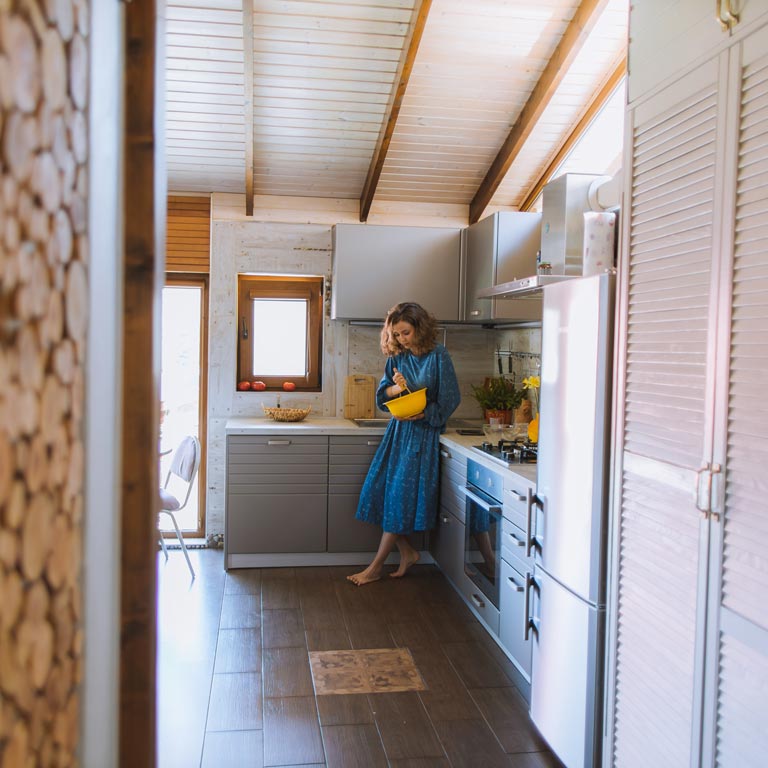
How does anxiety affect our weight?
Anxiety and weight control make a difficult circle to break. In many cases, when people suffer from these symptoms, they often eat more and worse to relieve them.
They often fall back on high-calorie and highly appetizing foods that temporarily relieve their feelings of anxiety, but later lead to a feeling of guilt and sadness.
In fact, a study carried out by psychologists from the Complutense University of Madrid, supported by the Spanish State Research Agency, has shown that during 2020, one in five Spaniards had symptoms of anxiety (19.6%). These symptoms are more common in women (26.85%) than in men (13.2%) and, curiously, more often in young people than in middle-aged or older adults.
What is anxiety and what are its symptoms?
Many of us have at some time suffered from these symptoms, even if we are not aware of them.
Anxiety is mainly a defence mechanism. When we feel under threat, our body acts to protect itself and to deal with these threats. The problem comes when anxiety gets in the way of our daily routines.
Signs of anxiety
Its most common symptoms are a feeling of anguish, which can be slight or moderate, an accelerated heart rate and breathing, and sweating or a feeling of weakness. These signs can appear in what is called a crisis, and that is when the feelings are much more severe
Sensations of crisis
The most common symptoms of so-called crises are:
- Palpitations or tachycardia (elevated heart rate).
- Feeling of suffocation.
- Tightness in the chest.
- Fear or panic.
- Sweating or chills
- Nausea or abdominal discomfort.
- Dizziness or even fainting
- Feeling of unreality
- Feeling of numbness or tingling
Causes of anxiety
Anxiety can be due to physical problems such as alcohol or other drug abuse, hyperthyroidism, or changing and/or exceptional situations, but most often its origin is psychological.
Food cravings, what is it?
 "I am unable to follow a diet because it makes me feel anxious". This is one of the most common statements in the doctors', endocrinologists', dieticians' and nutritionists' surgeries. From the sofa to the larder, from the larder to the fridge, a bit of chocolate, a bit of cheese, a bit of sausage and back to the beginning.
"I am unable to follow a diet because it makes me feel anxious". This is one of the most common statements in the doctors', endocrinologists', dieticians' and nutritionists' surgeries. From the sofa to the larder, from the larder to the fridge, a bit of chocolate, a bit of cheese, a bit of sausage and back to the beginning.
When we talk about food cravings, we are talking about an emotional state in which we "need to eat" without feeling hungry. This need, which usually appears in an impulsive and uncontrolled way, leads us to fall into a cycle. First, we eat to relieve the craving. Then we feel guilty for having eaten. And, in the end, we feel more anxious than at the beginning. And the cycle starts all over again.
Tips for keeping the weight off
It is never too late to start eating a healthy and balanced diet. Not forgetting to do sport or moderate training during the week, which is necessary to activate our metabolism.
Experts recommend meal planning and exercise as our best allies against overweight or those 'extra kilos' we want to get rid of.
The Obesity Institute of the Fundación Jiménez Díaz recommends:
- Plan your meals. Draw up a weekly menu that includes protein and vegetables at lunch and dinner and moderates the intake of unhealthy fats and carbohydrates.
- Plan your shopping. Make a list of healthy foods and keep to it. If you do not buy unnecessary foods, you will not eat them.
- Beware of snacking. Keep busy to avoid snacking. If you still feel the urge to eat, think twice and, if you cannot avoid it, choose healthy snacks and foods with fibre that will help you feel full.
In addition, physical exercise is essential. An adult who hardly does any exercise needs to eat between 1,300 and 1,700 calories a day.
Keys to manage food cravings and avoid snacking between meals
There are several psychological techniques, easy to learn, that can help us to deal with that anxiety when we feel like eating:
- Distraction: talking to someone, singing, playing games... this is a well-known technique that can help to take your mind off what is making you crave for food.
- Breathing control: diaphragmatic breathing, used in practices such as yoga or mindfulness, helps us to relax and, therefore, to control our emotions.
- Relaxation: there are different relaxation practices that you can do yourself, in your own home. Choose a calm, quiet place with a pleasant temperature to do it.
- Self-instructions: these are words or messages that you say to yourself to help you overcome your anxiety. The technique is simple: write down the sentences that can help you and read them or remember them when you feel the first signs of stress.
- Look for other kinds of rewards. Food cannot be your only reward. A walk, a massage, a simple chat with friends or family can also help.
- Take care of the quality of your rest. Lack of sleep makes us irritable and tired and increases the risk of suffering episodes of restlessness.
- Take physical exercise. Sport will increase your dopamine levels, just as it does with food, which will help to manage your anxiety.
- Follow a balanced diet. Keep to a good routine, take time to eat, eat slowly, chew your food well and always eat food that provides you with quality nutrients. Sometimes you can also supplement your diet with nutritional supplements to help support your balanced diet.
- Look for help from a specialist. If, even so, feelings of anxiety persist, it is time to ask for specialist advice.





